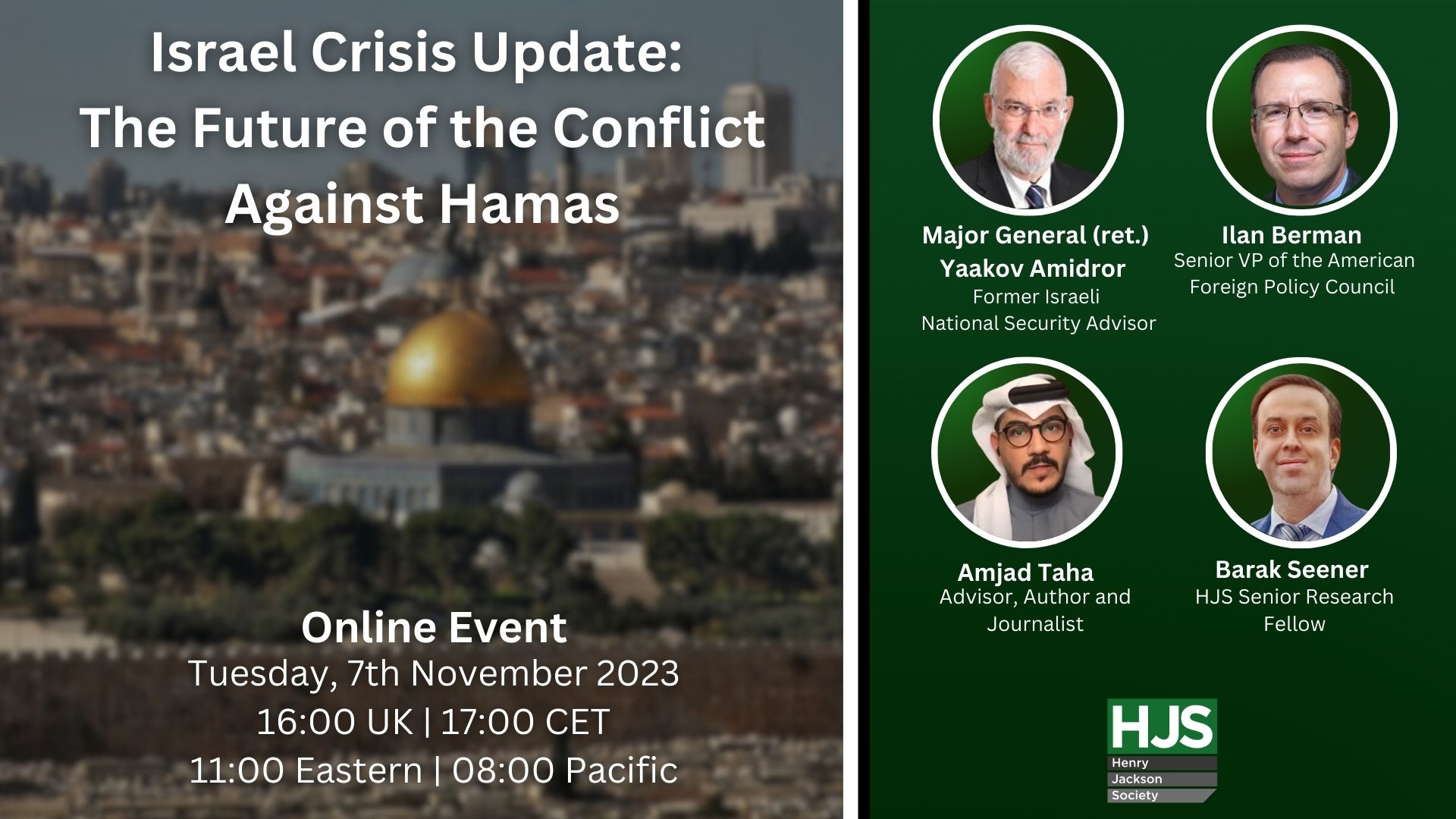Israel Crisis Update: The Future of the Conflict Against Hamas

- This event has passed.
Israel Crisis Update: The Future of the Conflict Against Hamas
7th November 2023 @ 4:00 pm - 5:00 pm

As the war in Gaza continues, casualties are mounting and international opinion is increasingly turning. Israel is facing unique operational challenges and is employing unprecedented military tactics and strategies that will be invaluable for Western militaries to study. What will it take for Israel to decisively defeat Hamas and will international opinion allow for it? Israel’s strategy on the battlefield is influenced by the US and Israel operating on the assumption that Iran can be deterred to prevent the conflict from escalating.
Questions remain on whether normalization between Israel and Saudi Arabia has been derailed, and to what extent the Abraham Accords have been undermined. Ultimately, as various theatres around the globe are interrelated such as Ukraine, Taiwan, the Arabian Gulf, and Gaza as Russia, China, and Iran offer each other logistical support, how may a decisive victory against Hamas shore up the liberal rules-based order?
The Henry Jackson Society is pleased to invite you to this timely discussion with regional experts who will be offering their views on where the Hamas-Israel war may take us and how it is going to shape and affect relations in the region and beyond.
This is the latest in an ongoing series of events providing expert insight on the ongoing Israel crisis.

Major General (ret.) Yaakov Amidror was the National Security Advisor to Prime Minister Netanyahu and chairman of the National Security Council (April 2011-November 2013). He served for 36 years in senior IDF posts (1966-2002), including commander of the Military Colleges (including the National Defense College, Staff and Command College, and Tactical Command Academy), military secretary to the Minister of Defense, director of the Intelligence Analysis Division in Military Intelligence, and chief intelligence officer of the Northern Command. He is the author of three books on intelligence and military strategy, Reflections on Army and Security (Hebrew, 2002), Intelligence, Theory and Practice (Hebrew, 2006), and Winning Counterinsurgency War: The Israeli Experience (JCPA, 2008).

Ilan Berman is Senior Vice President of the American Foreign Policy Council in Washington, DC. An expert on regional security in the Middle East, Central Asia, and the Russian Federation, he has consulted for the U.S. Central Intelligence Agency as well as the U.S. Departments of State and Defense and has also provided assistance on foreign policy and national security issues to a range of governmental agencies and congressional offices. He has been called one of America’s “leading experts on the Middle East and Iran” by CNN.

Amjad Taha is the Bahrain-based regional director of the British Middle East Center for Studies and Research, the author of The Deception of the Arab Spring, and an adviser to senior Gulf Cooperation Council officials. He is a social media influencer and is known for promoting the normalisation between Arab countries and Israel. Taha positions himself as a journalist and political commentator on Arab affairs.

Barak Seener is a Senior Research Fellow at the Henry Jackson Society and the founder of Strategic Intelligentia and the Gulf Futures Forum. Previously, Barak was a Global Intelligence Manager at HSBC and the Middle East Fellow at the Royal United Services Institute (RUSI) on whose behalf he has debriefed international defence and security policy makers and diplomats on matters relating to Middle East security. Barak has lectured at NATO as well as the Royal College for Defence Studies. He also staged the world’s first, and hugely successful conference in London at the Royal United Services Institute (RUSI) on Palestinian statehood. This examined the security Implications for the Region bringing together leading Israelis, Palestinians, US and European representatives in London 2011. Prior to joining RUSI, Barak was one of the Henry Jackson Society’s founders in Westminster and was the Henry Jackson Society’s Greater Middle East Section Director.
Barak published a book in 2018 entitled, ‘Commercial Risks Entering the Iranian Market: Why sanctions make investment in the Islamic Republic of Iran a high-risk proposition.’
Barak has published and provided analysis and expert commentary for a range of international broadcasters including Al-Jazeera, BBC, CNN, Chinese CCTV, Fox News, Sky News, Voice of America, and news outlets such as Bloomberg, Reuters, Associated Press, the Evening Standard, Jerusalem Post and Xinhua.
Barak has published in publications including Newsweek, the National Interest, the American Interest, Jane’s Intelligence Review and Jane’s Islamic Affairs Analyst on counter-terrorism, US-China dynamics, risks to supply chains, globalization and the end of the liberal international order, transatlantic relations, universal jurisdiction, nuclear proliferation and Middle East issues including the Arab Spring, tensions in Libya, Egypt and Syria, strategic and security dynamic between Iran and the Gulf, and the Palestinian-Israeli conflict.
***
EVENT SUMMARY
The Henry Jackson Society organised a panel discussion on Tuesday, the 7th, to provide insights into the ongoing Israel-Palestine conflict. The event featured man guest speakers. General Yaakov, who detailed the Israeli military’s operations in Gaza, outlined the stages of the ground invasion and airstrikes with the goal of destroying Hamas. He emphasised the distinction between civilians and terrorists, expressing Israel’s intent to free itself from responsibility for Gaza’s well-being. Amjad expressed his solidarity with Israel, condemning Hamas’ actions and addressing global instances of antisemitism, highlighting the historical presence of Jewish people in the Middle East as to the importance of a Jewish state for peace and the necessity of removing Hamas for Palestinian unity, averting Iranian influence, to achieve normalisation in the region.
Ilan focused on the interconnected nature of conflicts in Gaza, Ukraine, and Taiwan and emphasised their role in challenging the rules-based international order, particularly Iran’s involvement. Ilan discussed the Iranian regime’s strategy to cause discourse in the Middle East, via Hamas as a proxy to shift focus and enhance Iran’s strategic regional objectives. The interconnected nature of conflicts was stressed, with examples cited of shared technology and strategies among Iran, Russia, and China. The potential unravelling of the international order was warned against, emphasising the need for a robust presence across various conflict zones simultaneously to prevent escalation and maintain the liberal democratic order.
RELATED EVENTS
British General Election Campaigns 1830-2019: Can The Past Inform The Future?”
The British general election is the linchpin of our liberal democracy, and its results are often fundamental to how we live. With the next UK general election looming, there is therefore … Continued



